Acne Marks vs. Acne Scars: Understand and Treat
Acne Marks vs. Acne Scars: Understand and Treat
Acne is a common skin condition that affects people of all ages. While it can be frustrating to deal with active breakouts, the aftermath of acne can also leave its mark—literally. Two terms that are often used interchangeably but have distinct meanings in the world of skincare are "acne marks" and "acne scars."
Understanding the difference between these two terms is crucial for choosing the right treatments and products to address them effectively. In this comprehensive guide, we will delve deep into the world of acne marks and acne scars, exploring their causes, differences, characteristics, and how to deal with them. Whether you're looking to fade red acne marks or treat stubborn acne scars, this guide will equip you with the knowledge you need to achieve clearer and healthier skin.
The Impact of Acne on Skin
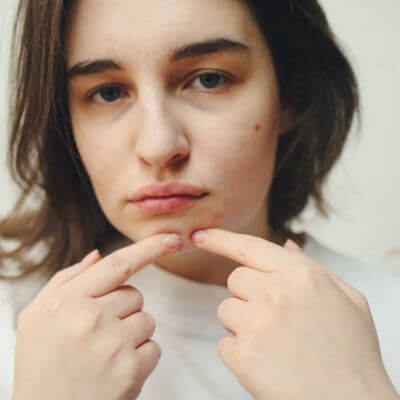
Acne is more than just a physical skin condition; it can also have a significant impact on a person's self-esteem and mental well-being. The visible blemishes and the discomfort associated with acne can lead to feelings of self-consciousness and even social withdrawal.
It's not surprising that many individuals seek ways to treat and manage their acne, both during active breakouts and after they've subsided. While there are various treatments available, it's essential to understand the different outcomes that can result from acne and how to address them effectively.
The Importance of Distinguishing Between Marks and Scars
Before diving into the specifics of acne marks and acne scars, let's emphasize why it's crucial to distinguish between the two:
- Effective Treatment: Differentiating between marks and scars is the first step in choosing the right treatment approach. What works for fading marks may not be as effective for treating scars and vice versa.
- Prevention: Understanding the causes and characteristics of marks and scars can help in preventing their formation in the first place. Prevention is often more manageable than treatment.
- Skincare Routine: Tailoring your skincare routine to target the specific issue—marks or scars—can yield better results. It also prevents the use of unnecessary products.
What Are Acne Marks?
Acne marks, often referred to as post-inflammatory hyperpigmentation (PIH), are flat, discolored spots that appear on the skin after an acne pimple or lesion has healed. These marks are not permanent and gradually fade over time. Unlike scars, acne marks do not involve a loss of tissue or collagen.
Types of Acne Marks :
There are several types of acne marks, each with its characteristics:
- Erythematous Marks: These marks appear as red or pink spots on the skin and are caused by inflammation. Erythematous marks are the most common type of acne marks and tend to fade relatively quickly.
- Hyperpigmented Marks: Hyperpigmented marks are darker than the surrounding skin and result from an overproduction of melanin during the healing process. They can vary in color from light brown to dark brown.
- Hypopigmented Marks: Less common than hyperpigmented marks, hypopigmented marks are lighter than the surrounding skin. They occur when there is a loss of melanin during the healing process.
How to Remove Acne Marks Naturally
The good news is that acne marks are not permanent, and there are several strategies you can use to help them fade more quickly:
Home Remedies for Acne Marks
- Topical Treatments: Over-the-counter creams and serums containing ingredients like niacinamide, vitamin C, and alpha hydroxy acids (AHAs) can help fade acne marks. These ingredients work by exfoliating the skin and promoting cell turnover.
- Sunscreen: Protecting your skin from UV damage is crucial, as sun exposure can darken acne marks. Always use a broad-spectrum sunscreen with SPF 30 or higher.
- Diet and Hydration: Eating a balanced diet rich in antioxidants and staying hydrated can promote skin health and potentially help marks fade more quickly.
- Patience: It's important to note that fading acne marks takes time. Be patient and consistent with your skincare routine.
What Are Acne Scars?
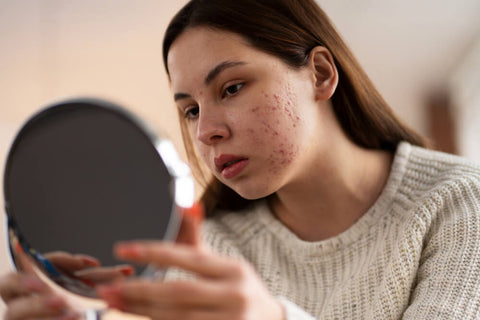
Unlike Acne marks, which are temporary and superficial, acne scars are permanent changes to the skin's texture and structure. Acne scars occur when there is damage to the deeper layers of the skin, including the dermis. This damage triggers the body's natural healing processes, but sometimes, the repair process can lead to the formation of scars.
Types of Acne Scars :
There are several types of acne scars, each with its unique characteristics:
- Ice Pick Scars: These scars are deep, narrow, and pitted, resembling small, round holes in the skin. They are often the result of severe acne and are challenging to treat.
- Boxcar Scars: Boxcar scars are broad, depressed scars with well-defined edges. They can give the skin a crater-like appearance.
- Rolling Scars: Rolling scars have a wavy, undulating appearance and are caused by the tethering of the skin to underlying tissue.
- Keloid or Hypertrophic Scars: These scars are raised and thickened compared to the surrounding skin. They result from an overproduction of collagen during the healing process.
How to Remove Acne Scars Naturally
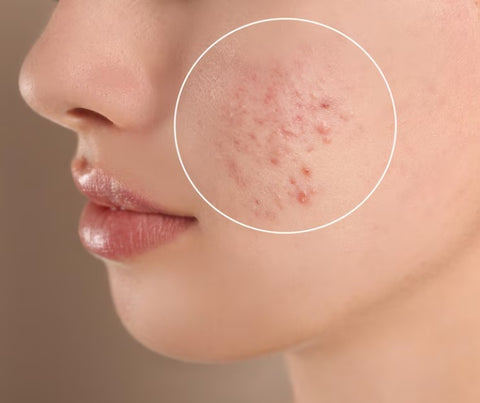
Treating acne scars can be more challenging than dealing with marks due to their permanent nature. However, there are several treatment options available, depending on the type and severity of the scars:
Professional Treatments for Acne Scars
- Chemical Peels: Chemical peels involve the application of a specialized chemical solution to the skin's surface. This solution exfoliates the topmost layer of skin, promoting the growth of new, smoother skin. It can be effective for mild to moderate acne scars.
- Microdermabrasion: Microdermabrasion is a non-invasive procedure that uses tiny exfoliating crystals to remove the outer layer of skin. It can improve the texture and appearance of mild acne scars.
- Microneedling: Microneedling involves the use of a device with tiny needles that create controlled micro-injuries in the skin. This stimulates collagen production and can improve the appearance of acne scars.
- Laser Therapy: Laser treatments, such as fractional laser therapy, can target specific areas of the skin to promote collagen production and improve scar texture. Different types of lasers may be used, depending on the scar type and skin tone.
- Dermal Fillers: Dermal fillers can be injected into certain types of acne scars to temporarily improve their appearance by filling in the depressions.
- Surgical Procedures: In some cases, surgical procedures like subcision (cutting the fibrous bands that tether the scar) or punch excisions (removing the scar and stitching the skin) may be necessary for deep scars.


Product Spotlight: Strictly Organics 2.5% Benzoyl Peroxide+ 5% Niacinamide + 1% Neem Ext. Anti Acne Spot Gel for Pimples and Acne Scars
One effective product for managing both pimples and acne scars is the "2.5% Benzoyl Peroxide+ 5% Niacinamide + 1% Neem Ext. Anti Acne Spot Gel." This targeted gel is designed to:
- Target and eliminate pimples quickly: It contains benzoyl peroxide, a potent bactericide that kills acne-causing bacteria, helping to dry out acne and pimples.
- Soothe inflammation and redness: Niacinamide, a key ingredient, has anti-inflammatory properties that reduce inflammation and promote overall skin health.
- Help fade acne scars over time: The gel's formulation assists in gradually fading acne scars, providing a more even skin tone.
- Pinpoint application for effective results: The gel can be precisely applied to affected areas, ensuring targeted treatment.
Upcoming Product: Strictly Organics Anti Acne Face Wash
Exciting news for those with acne-prone skin! There's an upcoming product to keep an eye out for – the "Strictly Organics Anti Acne Face Wash." It aims to provide gentle yet effective cleansing for acne-prone skin, removing impurities and excess oil without causing irritation.
Strictly Organics products are known for their commitment to using natural and eco-conscious ingredients, making this face wash a promising addition to their skincare lineup.
Difference Between Acne Marks and Acne Scars
Key Differences :
To distinguish between acne marks and acne scars, consider the following key differences:
- Temporary vs. Permanent: Acne marks are temporary and fade over time, while acne scars are permanent changes to the skin.
- Texture: Marks are typically flat and discolored, while scars can have a variety of textures, including depressions or raised areas.
- Depth: Marks affect the skin's upper layers, while scars extend deeper into the dermis.
- Causes: Marks result from post-inflammatory hyperpigmentation or changes in melanin production, while scars are the result of damage to collagen and tissue during the healing process.
Identifying Acne Marks vs. Acne Scars :
Identifying whether you have acne marks or scars may require close examination of your skin:
- Marks: Acne marks are often red, pink, brown, or lighter than your natural skin tone. They are flat and do not have a change in skin texture.
- Scars: Acne scars may appear as indentations, raised areas, or irregular texture on the skin. They can be flesh-colored, pink, brown, or darker than your natural skin tone.
If you're unsure about whether you have marks or scars, consult with a dermatologist or skincare professional for a proper assessment.
Why It Matters ?
Understanding whether you have marks or scars matters for several reasons:
- Treatment Approach: Marks and scars require different treatment approaches. Using the wrong treatment can be ineffective or even worsen the condition.
- Product Selection: Tailoring your skincare routine and product selection to your specific issue ensures that you address the problem effectively without overloading your skin.
- Expectations: Knowing whether you have marks or scars helps set realistic expectations for treatment outcomes. Marks tend to fade with time and appropriate care, while scars may require more extensive interventions.
Now that we've explored the differences between marks and scars, let's shift our focus to prevention and skincare tips.
Preventing Acne Marks and Scars :
Preventing acne marks and scars is often more manageable than treating them after they've formed. Here are some strategies to help prevent these skin issues:
- Early Acne Management: Treat acne promptly to reduce inflammation and minimize the risk of post-inflammatory marks and scars.
- Avoid Picking and Squeezing: Picking or squeezing pimples increases the likelihood of scarring. Hands can introduce bacteria and irritate the skin.
- Sun Protection: Always wear sunscreen with SPF 30 or higher to protect your skin from UV damage, which can worsen marks and scars.
- Gentle Skincare: Use a gentle skincare routine that includes a mild cleanser, non-comedogenic moisturizer, and products suitable for your skin type.
- Avoid Harsh Ingredients: Be cautious with strong skincare ingredients, such as retinoids and alpha hydroxy acids, and introduce them gradually to prevent irritation.
- Hydration and Nutrition: Stay hydrated and consume a balanced diet rich in antioxidants, vitamins, and minerals to support skin health.
FAQs:
Q1. Can acne marks turn into acne scars if left untreated?
A1. Acne marks, if left untreated, can sometimes take longer to fade, but they typically do not transform into permanent acne scars.
Q2. How long does it take for acne marks to fade naturally?
A2. The time it takes for acne marks to fade varies from person to person and depends on factors like skin type and the intensity of the marks. It can take several weeks to several months.
Q3. Can I use the same products for both acne marks and acne scars?
A3. Different products and treatments are more effective for marks and scars, so it's essential to distinguish between them and use the appropriate products.
Q4. Is it possible to completely remove acne scars?
A4. Completely removing acne scars is challenging, but significant improvements in their appearance are possible with various treatments.
Q5. Do acne scars come back once they've been treated?
A5. If treated effectively, the appearance of acne scars can be significantly reduced, and they are less likely to return. However, new acne breakouts can potentially lead to new scars.
Q6. Are there any dietary changes that can help prevent or treat acne marks and scars?
A6. A balanced diet rich in antioxidants, vitamins, and minerals can support skin health, which may indirectly help with the healing process of marks and scars. However, dietary changes alone are not a substitute for targeted skincare treatments.
Q7. Can I use makeup to conceal acne marks and scars?
A7. Yes, makeup can be used to conceal both marks and scars temporarily. However, it's essential to choose makeup products that are nonAcomedogenic and won't clog pores, as this can worsen acne.
Q8. Is it possible to prevent all acne marks and scars from forming?
A8. While it may not be possible to prevent all marks and scars, early and effective acne management, along with gentle skin care practices, can significantly reduce the risk of their formation.
Q9. How to Remove Acne Scars Naturally?
A9. Acne scars can be stubborn, but there are natural methods to help improve their appearance. use derma logically test Strictly Organics Anti Acne Spot Gel and De pigmentation Cream.
Conclusion
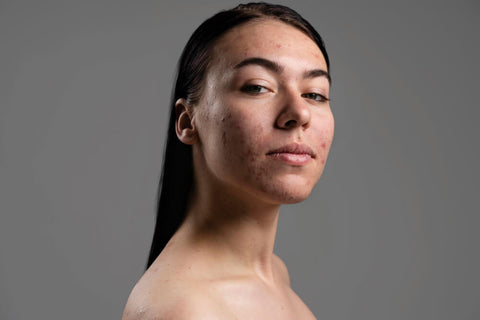
In conclusion, dealing with the aftermath of acne, whether it's acne marks or scars, requires a tailored approach to skincare and treatment. Understanding the key differences between acne marks and acne scars is essential for choosing the right products and interventions. With the right knowledge, patience, and consistency, you can achieve clearer and healthier skin.
With the right products, like the Strictly Organics 2.5% Benzoyl Peroxide+ 5% Niacinamide + 1% Neem Ext. Anti Acne Spot Gel and the upcoming Strictly Organics Anti Acne Face Wash, you can address both active breakouts and the aftermath of acne effectively.
Embrace your skin's journey, and remember that you are not alone in your quest for beautiful, blemish-free skin. Consult with skincare professionals for personalized guidance, and be diligent in your skincare routine``. With time and effort, you can fade marks and effectively manage scars, ultimately boosting your self-confidence and well-being.

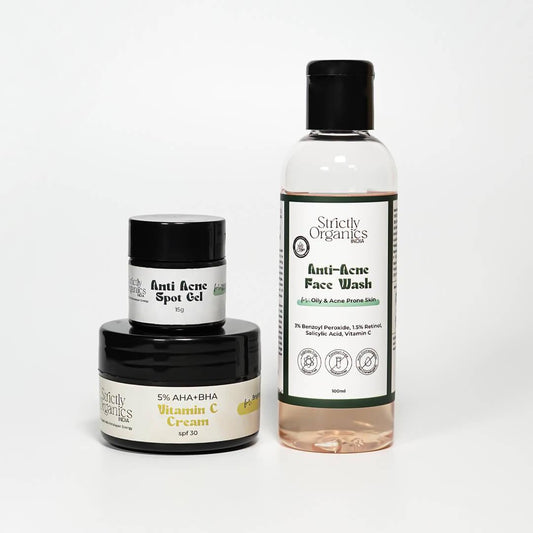
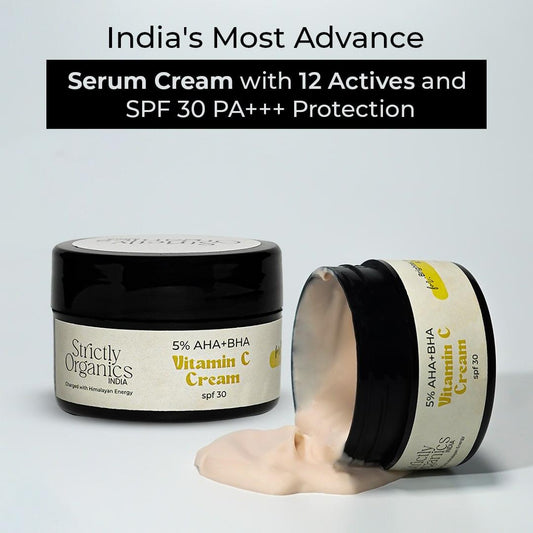
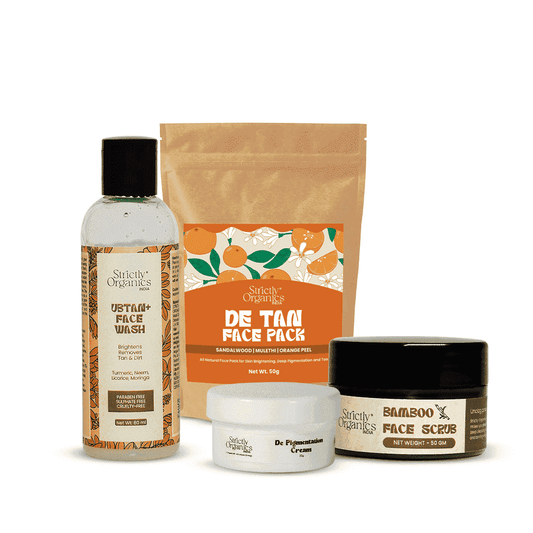
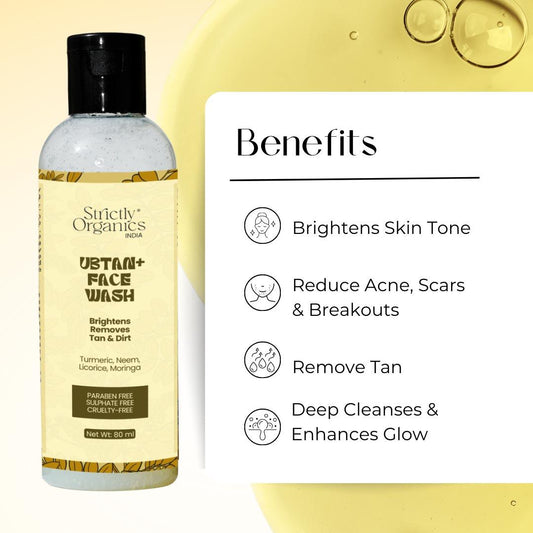
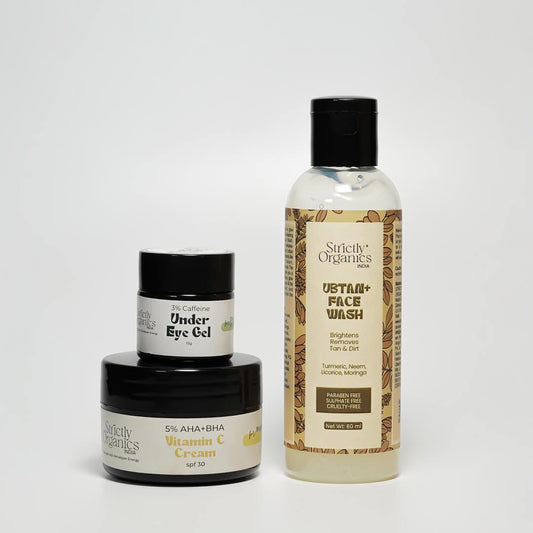
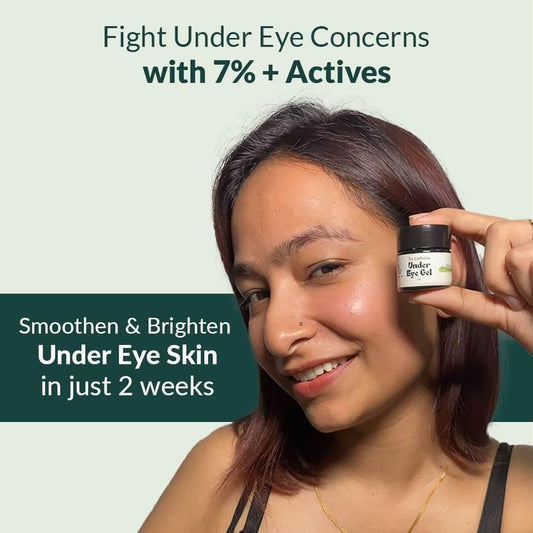

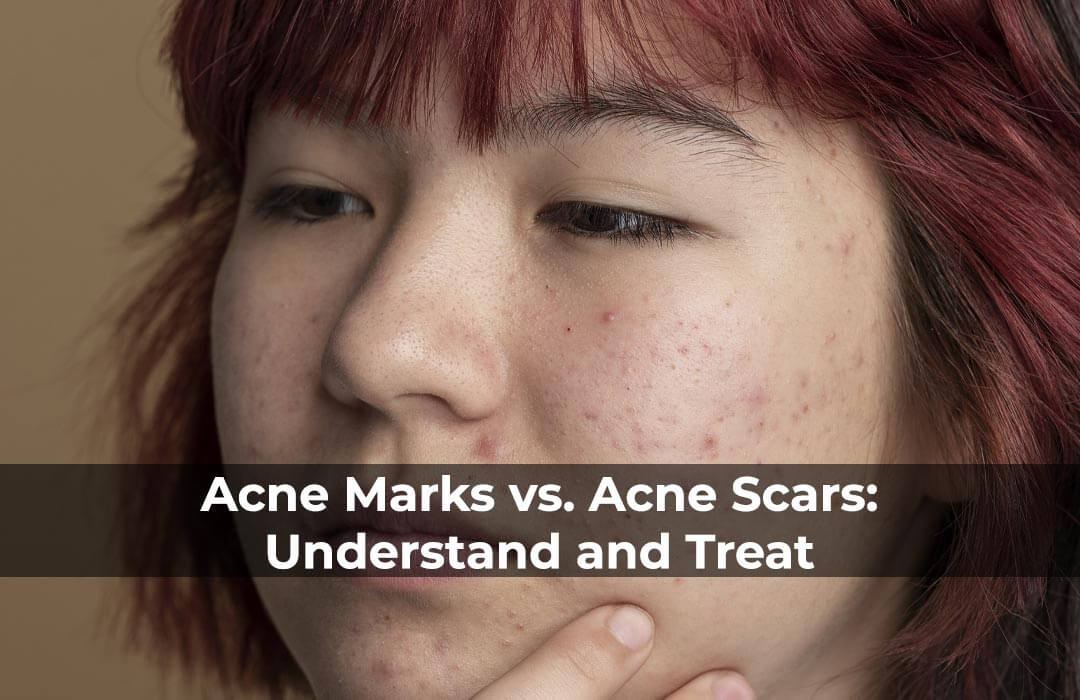
Leave a comment
Please note, comments need to be approved before they are published.